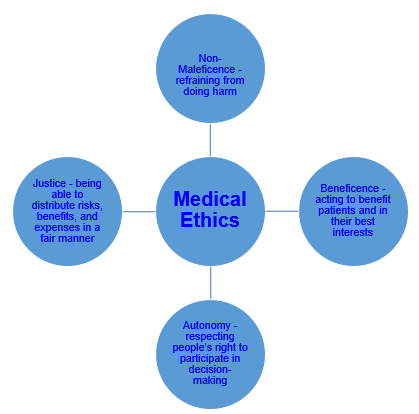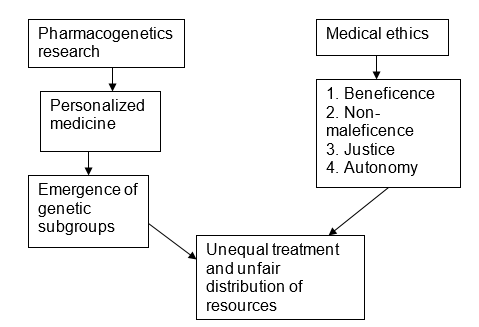Pharmacogenetics is a relatively young branch of medical science, but it is supposed to have significant potential when it comes to the effectiveness of treatment methods and attempts to make responses to various diseases more individualized. As the term suggests, the scientific branch in question studies the way that genes affect the action of various medications and delves into the phenomenon of genetic variation in the context of pharmacological problems. Apart from specific challenges linked to the actual uses of new findings in pharmacogenetics, modern scholars are concerned about the bioethical issues surrounding research in the field.
Considering the importance of ethically appropriate research on human subjects, one of the theories matching the components of the planned research is the four-principle theory formulated by Beauchamp and Childress. The selected grand theory outlines the basic ethical principles used in multiple professional fields, including medicine. James Childress and Thomas Beauchamp, the theorists, are specialists in the field of philosophy, and their research interests include animal ethics, bioethics, and the phenomenon of morality.
Concerning the theory and its paradigmatic origins, the four-principle approach utilizes and reinterprets well-known moral theories, including Ross’s moral principles and Aristotelian ideas of moral excellence. The internal dimensions or the ideas upon which the chosen theory is built include the ethical concepts of obligation and seven prima facie duties (fidelity, reparation, gratitude, justice, beneficence, self-improvement, and non-maleficence) formulated by Ross (Vamplew, Dazeley, Foale, Firmin, & Mummery, 2018). The links between the theory’s key concepts are presented below.

The topic of the ethical dimension of pharmacogenetics research can be studied by using the four-principle theory by Childress and Beauchamp discussed in the previous section. In general, the theory is considered universal and applies to different aspects of biomedical research and provider-patient collaboration. The key idea of the planned project is to review and explain the ethical controversies surrounding pharmacogenetics research.
It will help to understand the current ethical status of the branch and define whether personalized medicine and other proposed applications of pharmacogenetics meet the basic criteria of ethical practice. In addition, by analyzing the links between the widely-accepted principles of bioethics and ethical concerns related to pharmacogenetics studies, it will be possible to make some predictions related to the field’s future development.
The chosen topic is linked to studying critical responses related to the evolution of pharmacogenetics research with attention to the four ethical principles. The topic discussed in the given assignment will deal with a range of concepts, including bioethics, the mentioned four principles of ethically appropriate research, and the current ethical limitations of pharmacogenetics. As for the basic reason for criticism from the ethical viewpoint, making medicine more personalized with the help of pharmacogenetics involves dividing the population into a range of genetic subgroups. Such groups will be different in size and in terms of people’s financial opportunities and life circumstances due to the potential links between disease susceptibilities and race.
Considering these inter-group differences, pharmaceutical companies will be more interested in developing drugs for larger and wealthier genetic groups. As a result, the needs of the new “minorities” will not be met to the full extent, thus leading to the violations of all four principles of ethics. The diagram below demonstrates the conceptual framework for the selected topic in a more illustrative way.

Reference
Vamplew, P., Dazeley, R., Foale, C., Firmin, S., & Mummery, J. (2018). Human-aligned artificial intelligence is a multiobjective problem. Ethics and Information Technology, 20(1), 27-40.